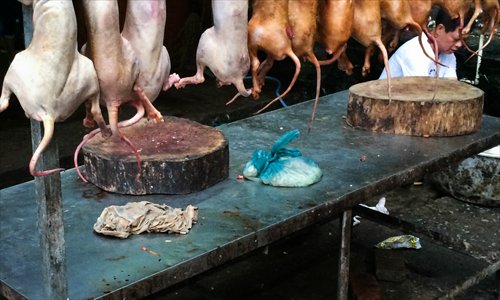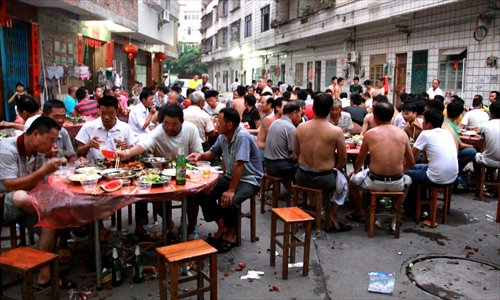Man bites dog festival

A stall selling dog meat in Yulin, Guangxi Zhuang Autonomous Region on May 19. Photo: CFP
Eight people who claimed themselves Buddhist followers, led by a monk, showed up at the largest dog meat market in Yulin, in South China's Guangxi Zhuang Autonomous Region on Wednesday, praying that the souls of butchered dogs can be released from suffering.
It's the latest move of animal rights activists calling for a boycott of the traditional dog meat festival that falls on June 21 this year, following protests that have even seen clashes with local business owners.
Now the Yulin government has denied hosting the festival, urging restaurant owners, civil servants and even medical staff to keep a low profile and adding that it will "strictly enforce" food safety regulations - effectively abandoning dog-meat lovers to their own devices.
Although awareness of animal rights has been steadily growing among the Chinese public, this year, increasing numbers of people have expressed their resentment at what they see as the self-righteousness of activists' blunt attempts to stop what are considered age-old traditions in some Chinese cities and towns.
Activists in action
The festival, slated for summer solstice each year, involves thousands of people crowding the streets of Yulin, eating dog-meat hotpot and lychees, and drinking strong liquor.
As a local tradition that is said to keep disease at bay, it is estimated that more than 10,000 dogs are killed for the one-day festival.
In response, China's animal-rights activists have urged Yulin residents to stop eating dog meat and abolish the festival.
Activists from many organizations including those based in Guangdong, Shanxi and the cities of Nanning, Liuzhou, Guilin and Hangzhou have gathered in Yulin, Shan Dai (a pseudonym), founder of Guangdong's The Best Volunteer Center, told the Global Times on Tuesday.
"We have jointly conducted research and investigation into Yulin dog-meat consumption and the 'black chain' of trading in stolen pets and stray dogs," Shan said, adding that they had reported these cases to the local government, and asked authorities to publish the licensing information for local dog-meat merchants.
On Friday last week, several activists held banners and posters saying that, "National rabies prevention is above dog-trade profit" and calling for food safety in front of the Yulin government building.
Chinese celebrities have also joined the boycott of the festival. On May 30, Hong Kong movie director Derek Yee wore a sticker calling for the cancellation of the Yulin festival while attending the premiere of his movie Overheard 3. Other Chinese celebrities, including actresses Sun Li, Yang Mi and Zhao Wei, also made appeals on social media.
Meanwhile, the Nandu Daily reported that one local restaurant owner, surnamed Ning, recently received dozens of harassing phone calls and messages per day, with some dog lovers calling at midnight, reminding her to be careful about the safety of her family members.
Amid an increasing chorus of disapproval from legal professionals, celebrities and food safety experts, the Yulin government issued a bizarre notice on June 6, claiming that it has never organized any form of dog meat festival.
Despite efforts by local authorities and merchants trying to appease the discontented people, the confrontation has become more intense this year, with one side citing social, moral and even legal norms to prove its point, and the other demanding respect for local customs.
An Internet research by ifeng.com showed by Wednesday that 37 percent of over 20,000 voters believed that a boycott is "over-reactive" and "forcing ideas on other people." Meanwhile,22 percent said that activists should respect people's eating habits, and 40 percent support the boycott but
opposed any extreme actions.

Local residents feast on dog meat on Saturday. Photo: CFP
Licenses and laws
Restaurants and booths owners in the city have meanwhile covered or even cut off the word "dog" from their signage. A local restaurateur surnamed Xie told Nandu Daily that food-hygiene supervision departments suggested this. Authorities have also advised those owners to reduce dog meat sales. The trade has seen its revenues decrease by two thirds recently, Xie said, although several restaurants told the newspaper that business remained normal.
News portal youth.cn reported on June 10 that 10 unidentified people broke down the door of a slaughterhouse in Yulin and confronted merchants, while trying to save the dogs.
"We stopped them from taking the dogs away because that would violate the regulations," Wei, an officer with the city's Aquatic Animal Husbandry and Veterinary Bureau, told chinanews.com.
Wei added that they temporarily closed down the slaughterhouse for failing to present a valid license but reopened it after the owner presented his quarantine certificate.
In Beijing, more than 2,400 kilometers away from Yulin, lawyers, food-safety experts and sociologists attended a forum held on Sunday to discuss animal welfare and animal protection legislation based on the festival.
"We are trying to promote knowledge of the law to the public by holding the forum," said Li Weimin, a lawyer with a Beijing-based law firm which hosted the forum together with the public policy center of China University of Political Science and Law.
"To persuade people to stop eating dog meat with extreme actions and fierce arguments would be counter-productive. We should advocate the idea in a reasonable way," Li said.
Li believed that while eating dog meat is not illegal, running such a business is, since China doesn't have quarantine regulations on dog or cat-meat products, unlike those for pork, chicken or beef.
The Ministry of Agriculture issued a quarantine regulation on dogs and cats in 2013, requiring a laboratory quarantine for the animals before they are transported.
However, Beijing-based lawyer Yi Shenghua told the Global Times that while the trade in China is not outlawed, businesses should legally present the license required. Since it's hard to breed dogs on a large scale, Yi says most dogs are "purchased," and it's difficult for authorities to supervise channels in which illegal means are often used.
Li suggested that activists should make constructive proposals, instead of simply protesting. "We need to take this slow, by filling up the legal vacuum on animal welfare first, then help regulate the way people treat animals and gradually educate the public," Li advised. One 600-year-old dog meat festival, in Jinhua, Zhejiang Province, was canceled permanently in 2011.
Newspaper headline: Canine cuisine controversy comes to boil in Yulin